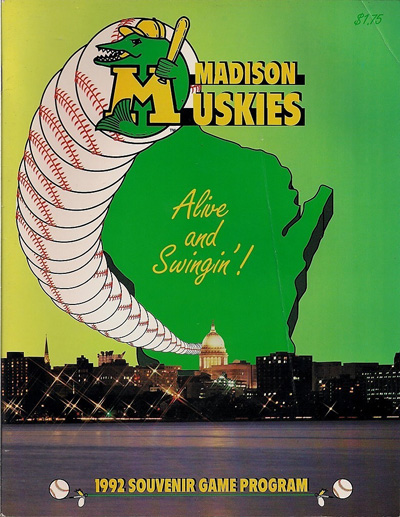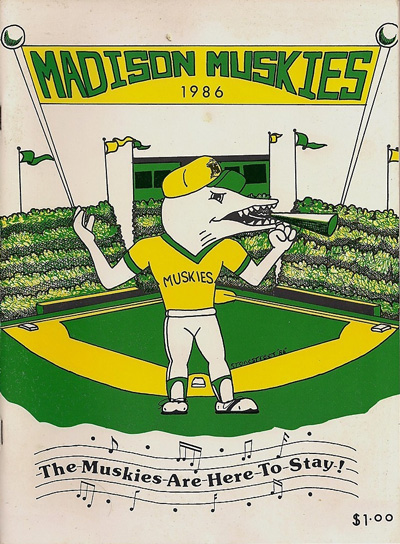Tombstone
Born: 1981 – Midwest League expansion franchise
Move Announced: March 9, 1993 (West Michigan Whitecaps)1Drumright, Steve. “Michigan investor group buys Madison Muskies”. The Wisconsin State Journal. March 10, 1993
First Game: April 14, 1982 (L 8-7 @ Wausau Timbers)
Last Game: September 2, 1993 (W 10-8 @ Appleton Foxes)
Midwest League Championships: None
Stadia
1982: Breese Stevens Field
1982-1993: Warner Park (4,000)21992 Madison Muskies Program
Opened: 1982
Dimensions (1990): Left: 350′, Center: 385′, Right: 350′31989 Madison Muskies Program
Marketing
Radio:
- 1987: WIBA (1310 AM – Five home games only)
Radio Broadcasters:
- 1987: ?
Ownership & Affiliation
Owners:
- 1982-1985: Pete Heitman, Norm Clark, Joe Ryan (General Partners) & Limited Partners
- 1986-1987: Madison Professional Baseball, Inc. (Dan Neviaser, Joe Ryan, Frank Boerner, et al.)
- 1988-1993: Chuck Barnhill & Barbara Bronner
Major League Affiliation: Oakland Athletics
Attendance
Tap (mobile) or mouse over chart for figures. Tilting your mobile device may offer better viewing.
Sources:
- The Encyclopedia of Minor League Baseball (1st ed.), Lloyd Johnson & Miles Wolff, 1993 (1982-1992 figures)
- Baseball America 1994 Almanac (1993 figures)
Trophy Case
Midwest League Most Valuable Player
- 1982: Tom Romano
Background
The Madison Muskies enjoyed a twelve-season run in Wisconsin’s capital city, serving as a Class A farm team of the Oakland Athletics.
Road To The Majors
Oakland had a rich farm system during the 1980’s as the A’s used homegrown talent to build towards their remarkable streak of three straight World Series appearances from 1988 to 1990. Jose Canseco (Madison ’83), Terry Steinbach (Madison ’84) and Walt Weiss (Madison ’86) all spent time as Muskies before developing into All-Star performers for Oakland’s dominant pennant-winnings teams of the late 80’s.
It’s worth noting that when Oakland lost the 1988 World Series to the Los Angeles Dodgers in five games, the Dodgers’ winning pitcher in Game 4, Tim Belcher, was also a Madison Muskies alum (’84).
The later years of the Muskies were less bountiful in terms of player development. The 1988 squad included third baseman Scott Brosius, who would go on to win three straight World Series with the New York Yankees from 1998 to 2000. Brosius was named World Series Most Valuable Player in 1998.

Off Field Issues & Move To Grand Rapids
“The Fish” were a popular box office attraction in their first couple of seasons. But behind-the-scenes instability and the gradual descent of Warner Park into obsolescence began to take the bloom off the rose.
The team’s original ownership scheme was a clunky set up that paired a General Partnership of three out-of-state owner with a large number of mostly local Limited Partners. After the Muskies’ second season in 1983 the two sides began to squabble over the payment (or non-payment, to be precise) of dividends to the local group. The dispute end up in court, causing distraction throughout the 1984 and 1985 seasons before the Fish were finally turned over to local ownership in 1986.
Meanwhile, Minor League Baseball experienced a late 1980’s boom that saw sophisticated investors surge into the game, fueling new stadium construction and an explosion in franchise values. Major League Baseball raised their minimum standards for minor league facilities in the contentious 1990 Professional Baseball Agreement that governed the relations between Major League Baseball clubs and their minor league affiliates. Muskies ownership haggled with Madison officials over modest six figure upgrades to Warner Park while newer Midwest League clubs like Illinois’ Kane County Cougars settled into brand-new $5 million ballparks.
The Muskies nearly moved to Kalamazoo, Michigan following the 1990 season. That move fell through and the Fish hung in for a couple of more money-losing seasons. But in March 1993, the Muskies were sold to investors in Grand Rapids, Michigan who planned to open a privately-financed $5.5 million ballpark with 28 luxury boxes there in 1994. The Muskies played one final lame duck season in Madison during the summer of 1993 after the move was announced.
Aftermath
Re-branded as the West Michigan Whitecaps, the former Muskies franchise shattered the all-time Class A Minor League Baseball attendance record during their first season in Grand Rapids. The Whitecaps drew 475,212 fans for the 1994 season. They still play in Grand Rapids to this day.
After the Muskies left town, Madison wound up with a new Midwest League franchise for the 1994 season. The Madison Hatters were a St. Louis Cardinals farm club. But the Hatters’ 1994 attendance numbers (69,060) were worse than any of the Muskies’ twelve seasons in town. When it became clear to the Hatters owners that a new ballpark was not in the cards in Madison, the club decamped for Battle Creek, Michigan after one season.
Warner Park later hosted an independent (non-Major League affiliated) pro team, the Madison Black Wolf, during the late 1990’s. In 2001, the amateur collegiate Madison Mallards arrived in town and established a rabid following. The Mallards have proven that Warner Park can be viable as a modern baseball venue after all and have become one of the country’s model collegiate wooden bat league clubs.
Madison Muskies Shop
[auction-nudge tool=”listings”]
In Memoriam
Pitcher Greg Ferguson, drafted by Oakland in the 1988 June amateur draft out of Virginia Tech University, spent part of his 1988 rookie professional season with Madison. In December 1988, Ferguson was struck and killed by a drunk driver while walking in his home town of Bassett, Virginia. He was 22 years old.
Downloads
6-1-1989 Muskies vs. Kenosha Twins Scorecard
6-1-1989 Madison Muskies vs. Kenosha Twins Scorecard
Links
###



2 Responses
Back in the 1980’s the women had a Madison Muskie team and we played at that stadium in Madison. Do you have any pictures of when we played there?
Hi Renee,
That’s interesting. Was it softball or baseball? I don’t have any photos of the women’s Muskies, but perhaps you’ll get lucky and another commenter here might have something for you.
Drew